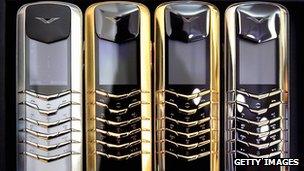Nokia cuts another 10,000 jobs as losses deepen
- Published

Nokia has dropped its own smartphone software in favour of a Microsoft system
Nokia is cutting another 10,000 jobs globally and has warned that second-quarter losses from its mobile phone business will be larger than expected.
The cuts bring total planned job cuts at the Finnish group since Stephen Elop took over as chief executive in September 2010 to more than 40,000.
Nokia will also book additional restructuring charges of about 1bn euros (£811m; $1.3bn).
Nokia shares closed down 18% and have slumped about 70% since February 2011.
"These planned reductions are a difficult consequence of the intended actions we believe we must take to ensure Nokia's long-term competitive strength," Mr Elop said in a statement.
Last year, Nokia announced it would phase out its own Symbian smartphone operating software and, for its smartphones, focus on Microsoft's Windows Phone operating system.
Reducing costs
Nokia will close its last remaining plant in Finland, at Salo, although it will continue to do research there.
Research and development sites at Ulm in Germany and Burnaby in Canada will also close.
The company hopes to complete the closures and redundancies by the end of 2013.
It expects the process to cost 650m euros ($817m) this year and 600m euros ($754m) next year.
The overall aim is to reduce core operating costs to 3bn euros ($3.8bn) a year.
Raising sales
Slashing costs should moderate Nokia's operating losses, but Lee Simpson, an equities strategist at Jefferies, said: "It probably isn't enough."

Nokia is selling luxury brand Vertu whose phones can sell for as much as $310,000
"We've got a succession of issues that Nokia has to address. Nokia holds a rump of patents and intellectual property that really should manifest [it] as a much better player in the smartphone market than it currently is," he added.
Nokia did not give guidance on its forecasts for revenue on Thursday, but according to research by the consultancy Gartner, it has lost market share to both Apple and Samsung to become the world's third biggest seller of smartphones.
If Nokia is to return its mobile phone business to profit, it will need to boost sales of smartphones, which now account for nearly a third of all mobile phone sales.
Nokia also announced it was selling its luxury handset maker, Vertu. The mobile phones are made from precious metals such as platinum. Some are encrusted with diamonds and sapphires and sell for as much as $310,000.
Private equity investor EQT is buying the high-end brand for an undisclosed price reported to be approximately 200m euros ($250m).
- Published11 April 2012
- Published27 February 2012
- Published11 February 2011